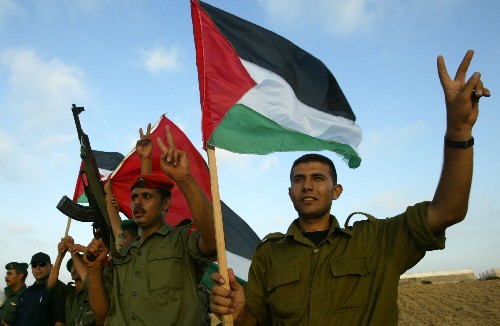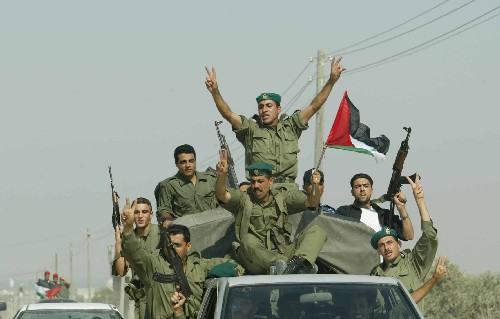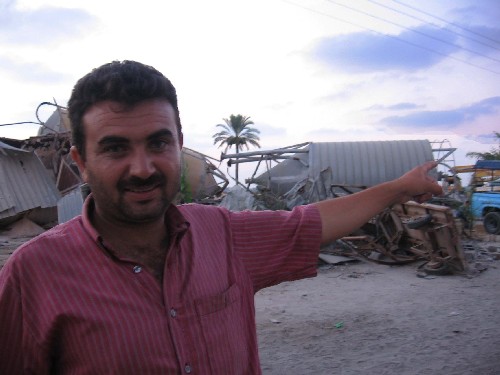Hope or Horror? Impending "Disengagement" Riddled with Uncertainty
Muhammed Omer, Gaza Strip | 19.08.2005 11:54 | Anti-militarism | Repression | Social Struggles




The one thing that seems to be certain is that Sharon has staked his political future on removing all the Israeli settlers from Gaza, and from four small settlements in the northern West Bank. Such vague plans that have been announced so far involve an orderly and voluntary removal, but Sharon has left little doubt that the Gaza settlements will be emptied, by force if necessary.
The settlers themselves fall into two main groups: roughly half are secular or moderately-observant Jews who were attracted to the Gaza and West Bank settlements by strong financial incentives—low housing costs, tax incentives, free land, business opportunities. The other half of the settlers, however, follow an ultra-Orthodox theology that, they claim, insists they must physically occupy "eretz Israel"—"greater Israel"—and displace all the non-Jewish inhabitants. Their presence in the settlements is God's will, their inescapable religious duty. While their motives are religious, the Israeli government—whatever its leanings any given year—has supported them for political reasons.
The fervor—some would call it fanaticism—of the religious settlers has forced many of their secular neighbors into an awkward double game. Those who announced publicly they would be happy to leave Gaza if given adequate compensation and financial assistance in starting over have been denounced as traitors or worse by the ultra-Orthodox. Many received death threats, were harassed or even beaten. As a result, many secular settlers have secretly approached the Disengagement Management requesting compensation and voluntary evacuation, while in public, to preserve their safety, offering lip-service to the hard-liners. Making matters worse, the Sharon government has been painfully slow in announcing re-settlement plans, and the promised compensation has yet to be paid.
In the West Bank, the Apartheid Wall, denounced as illegal by the International Court, has separated Palestinian towns, villages and cities from each other and from their farms and groves, but the route of the Wall has also left some 70 Israeli settlements, some only isolated outposts, on the Palestinian side. There as in Gaza, some of the secular settlers—who moved to the settlements for financial reasons—would be happy to relocate if offered a good financial deal, but in the highly-charged atmosphere, feel it is much too dangerous to say so publicly.
The religious settlers, led by many outspoken rabbis in and out of the settlements, are opposing the disengagement with everything from media-savvy civil disobedience, to threats of violence, and even medieval curses. For them, the end—doing God's will by staying in the settlements—justifies almost any means, for their enemies are not just Israel's enemies but God's.
Many observant modern Jews had never heard of the Pulsa d'Nora ceremony (the "Scourge of Fire"), let alone seen it, when footage of the medieval rite recently surfaced on Israeli TV. Rooted in Kabalistic lore and ceremonial magic, the ritual calls down the most elaborate and dire curses on its target. A description sounds like a piece of horror fiction: twenty black-robed rabbis enter an underground cave in the middle of the night, light black candles, and keep repeating after the leader the name of the one to be cursed—most recently, "Ariel Sharon." In solemn prayers, the rabbis called upon the Destroying Angel to kill Sharon. Further, if by chance the rabbis misjudged the situation and their intended victim, Sharon, does not deserve death, then, they stipulate, may the Destroying Angel kill the twenty rabbis.
The extremist rabbis make no secret of the fact that the Pulsa d'Nora ritual was done against the late Israeli Prime Minister Itzak Rabin and, they insist, it succeeded brilliantly. In fact, a fanatic young Israeli student, Yeghal Amer, assassinated Rabin, but according to the rabbis, it was really the Destroying Angel at work.
Most Palestinians in Gaza can cite less arcane sources for their hardships. With the disengagement slated to begin mid-August, the checkpoint closures have been frequent. At the closed Abu Holi checkpoint in mid-Gaza, Jedallah Al Huat, 28, explained that he used to work at the Gush Katif settlement. There, starting at age 16, he was employed as a tailor for Israeli settler Toni Bukra, 38. When the impending disengagement was announced, Bukra offered to sell the furnishings of his clothing factory to Al Huat. They settled on a price of 300,000 shekels (roughly US$7000) for the machines, factory equipment, fabric inventory and finished clothing, which Al Huat brought to his home in Gaza where he hopes to establish his own business post-disengagement.
Over the years, Al Huat got to know his employer and explained, "The settlers in Gush Katif have had a comfortable life. More than that, they've grown rich here. The first time I ever met Toni, he was riding an old black bicycle. Now he drives a 2005 model Suzuki. Toni was in a very shaky financial situation before he came to Gaza—I doubt you could call it middle-class. But he's done very well in Gush Katif," Al Huat explained. "And when he leaves, he'll get lots of money for his house, his clothing factory, and for his 13 donums of greenhouses."
A number of sources said Bukra has signed up for voluntary evacuation and compensation, but Bukra himself denied this in a phone interview. So, then, he was being forced to leave Gaza? "I'll have no choice," he replied. "When the army asks me to evacuate, I will move, and I will find a good place to live."
Bukra's pragmatic approach is light-years away from the prevailing sentiments at the nearby Neve Dakalim settlement. There, not just the IOF forces guarding the Israeli enclave, but many of the settlers are armed, and frequently open fire at the civilian neighborhoods of Khan Younis. In January of this year, 15 year old Ahmed Abu Mustapha was walking down the street when he was shot dead by a sniper in the settlement.
One of the Neve Dakalim residents, Rakhel Suashten, 64, started life as an American citizen. She still speaks English with a strong American accent, and has kept her American citizenship as well. She first became a settler in 1968, and moved to Neve Dakalim in 1997. "This is not a disengagement," she declared. "I am going to be thrown out of my own house here in Gaza, forcibly removed from my neighbors and my home. I have not packed my bags. We are all praying it will not happen."
But has she—just in case the worst does happen—signed the papers to get financial compensation? "Of course I didn't sign!" she almost shouted. "I don't want tainted money." Verbally, the elderly woman is as militant as her armed neighbors. "The Palestinians are the ones who should be thrown out," she insisted "That's part of our Bible—don't you know that?" she asked.
Roughly half the settlers share Mrs. Suashten's hard-line position, and they have support from within Israel as well. The Palestinians in Gaza are bracing themselves for a total closure of all the Gaza checkpoints and border crossings during the evacuation, partly to prevent the extremist settlers from bringing in supporters. The Israeli army has already had to stop thousands of anti-disengagement protesters from entering Gaza.
One of the most vocal and visible anti-disengagement groups is Motset Yesha, funded, according to their spokeswoman, Ruti Liberman, by the Israeli government. Improbable as that claim sounds, the anti-disengagement forces are unquestionably well-organized, well-funded, and highly-motivated. Jadi Rosen, spokeswoman of the Gush Katif Regional Council, is never far from her cell phone these days. "I'm on my way back to Gaza from a setter's demonstration against the Prime Minister," she said in a phone interview. Ms. Rosen has often stated her outright hatred of Palestinians. Told that this reporter was writing for Morgenbladet, she interrupted to say, "Oh, we have many good friends and supporters in Norway working against the disengagement." Although I gave her my name, I am still not sure whether she simply wasn't listening, or perhaps thought ethnic Norwegians are often named "Mohammed."
Why, I asked, did Sharon want to evacuate the Gaza settlements? "Sharon has personal problem with corruption," she answered, "but we settlers are the ones paying the highest price. Of course," she added, "the Palestinians will starve when we leave. We have been employing them in our settlements, but once we're gone, this will be nothing but a jail for them."
"Have you ever looked at a map of the world?" I asked her.
"I have one with me," she replied.
"Then how," I asked, "did it happen that Israel is sitting in the middle of 22 Arab nations here in the Middle East?"
"The word 'Palestinian' doesn't exist," she shouted. "There are no Palestinians! All this land was given to us by God! And if you refer me to the world map, I refer you to the Scriptures!"
I resisted the temptation to ask that if Palestinians did not exist, to whom, then, was she speaking? Instead, I asked her opinion of Sharon—if, as she'd often stated, Sharon was doing a grave disservice to Israel and the Jews, then who was Sharon serving in his war against the Palestinians?
I didn't get to finish the question when Rosen shouted, "War against Palestinians? What do you mean? It's the Palestinians who are killing Israeli citizens."
"Ah, then are you telling me that those helicopters we see on TV shelling Palestinian schools and firing on Palestinian civilians, and those bulldozers destroying Palestinian houses—are you telling me those helicopters and bulldozers are Palestinian?"
“The Palestinians should thank us for employing them in our land, instead of fighting against us!” Rosen insisted. "It seems that you don’t know our history, you know nothing of the truth. Please go study our history and you'll see we are the owners of this land." Despite her extreme religious views, Ms. Rosen hasn't completely ignored more mundane considerations. Before we finished our conversation, she pointed out the amount of money being offered the settlers "is not enough to buy a flat in the North of Israel!"
One wonders how the media and the politicians, in and out of Israel, will react to TV footage of women and children being forcibly removed from their homes, or of the Israeli army grappling with Israeli protesters. Repeat anything often enough, convincingly enough—whether one is calling Palestinians "terrorists," or the disengagement plan an abomination in the sight of God—and some people will believe it. Certainly, the extremist settlers and their supporters are stating their case in the strongest possible terms. After even brief talks with a few of them, the dilemma of the secular settlers becomes clearer. People like Jadi Rosen, many of them armed to the teeth, are living next door or down the street. When and how will those willing to evacuate declare themselves? Will they defy their neighbors and the extremist rabbis? What provision—if any—has the Israeli Army made to protect them from their militant neighbors? Is Sharon—as many analysts fear—trying to engineer an
evacuation so difficult, so traumatic, so expensive, that the Europeans and Americans will accept his land-grab in the West Bank? These are all vitally important questions for every living soul in Gaza, but so far, no one has answers.
"The world is a dangerous place to live;
not because of the people who are evil,
but because of the people who don't
do anything about it."
www.rafahtoday.org
Muhammed Omer, Gaza Strip
 e-mail:
rafahtoday@yahoo.com
e-mail:
rafahtoday@yahoo.com
 Homepage:
http://www.rafahtoday.org
Homepage:
http://www.rafahtoday.org
Comments
Display the following 4 comments